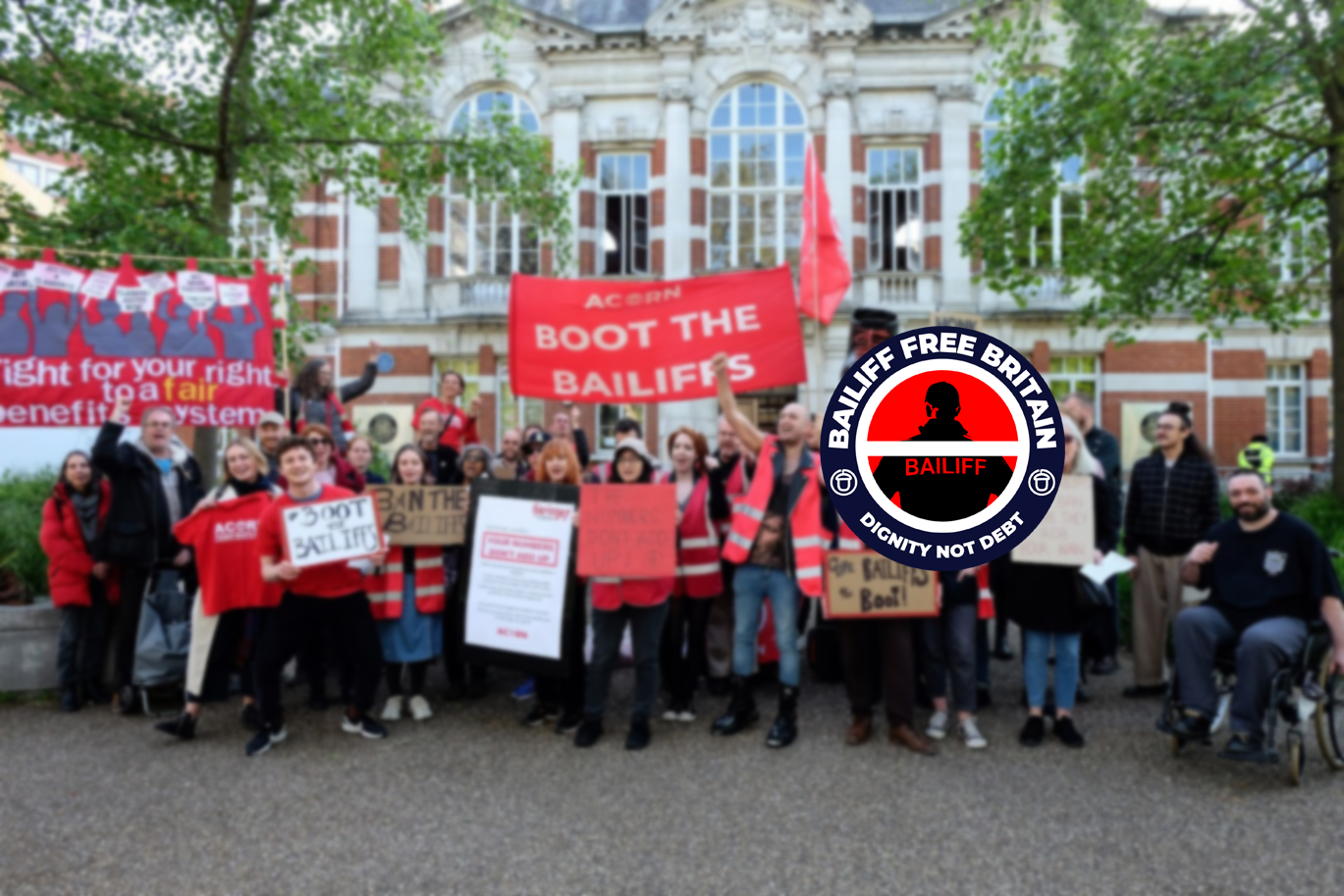Dignity Not Debt
The council tax system is broken. It’s unfair and ineffective, with poorer homes paying disproportionately more than rich ones.
And the way it’s collected isn’t just failing to help – council tax debt is rising and bully bailiffs are profiting from the crisis – it’s hurting people and damaging our communities.
But ACORN is fighting back – campaigning for a fairer system, and dignity for our families and our communities.
Join the movement today: together, we win!
Click here to find out more…
£7 billion is owed in council tax debt in England and Wales, and that number is rising.
People already squeezed by the cost of living crisis are being trapped in a debt spiral, unable to pay and with added costs being piled on for every missed bill.
An overdue £100 can quickly snowball into a £hundreds more, pushing people further into debt, and can even make someone liable for the entire year’s bill overnight.
At the same time, private bailiff companies are cashing in on the crisis and making massive profits while our communities suffer, adding stress, fear, and even more debt.
Data collected by Citizens Advice shows that 1 in 3 people contacted by bailiffs report rule-breaking or intimidation, including seizing the wrong items and refusing to discuss affordable payment plans.
Take Action!
There’s lots to come from this campaign, but here are some things you can do right now to make a difference…
👉 Join ACORN, join the movement for a Bailiff Free Britain!
👉 Tell the Government it’s time for change
👉 Share your experience of bailiffs or council tax debt
👉 Problem with bailiffs? Head to our Bailiff Member Defence form
What we’re campaigning for…
- An end to the use of bailiffs to collect council tax debt.
- Statutory powers for the Enforcement Conduct Board. Bailiffs should have no role in collecting Council Tax but as an immediate control measure before abolition they must be properly monitored and the body tasked with regulating them must have the legal power to enforce standards.
- An end to imprisonment for non-payment of council tax debt.
- Liability order* fees capped at £10, or at a level which reflects the actual cost to councils for the administration and paperwork.
- Residents given the maximum amount of time possible to address their arrears before a council can seek a liability order*
- A statutory pre-action protocol laying out steps all councils should take before seeking a liability order, ending the postcode lottery dictating how people in debt are treated when struggling to pay council tax.
- The government to commit to exploring alternatives to council tax, such as a proportional property tax, as a fairer system of local government revenue creation.
* A liability order is a court order that gives councils the legal powers to recover unpaid Council Tax debt including deductions from benefits or wages, using bailiffs, or even prison.
Frequently Asked Questions
But don’t council’s need to be able to collect council tax arrears?
Councils need tax to run public services – but using bailiffs isn’t a fair or effective way of collecting council tax arrears.
Resorting to bailiffs, adding on more stress and financial pressure, rather than taking early, supportive or preventative action for those in debt, results in bigger problems and a bigger financial burden further down the road.
Ultimately, council tax needs replacing with a fairer system, and we’re calling on the Government to replace it with a proportional property tax.
What about people who refuse to pay?
The system is so punitive that it seems to be designed assuming that all people in council tax debt are just refusing to pay, but evidence shows the vast majority of people in council tax debt are people living close to or below the poverty line.
There are other mechanisms that councils can use to recover withheld council tax other than using bailiffs such as attachment to earnings or benefits orders, or investing in early intervention and support to resolve the issue without it needing to go to court.
What about landlords who don’t pay on empty homes or properties they own?
Our campaign proposals are all aimed at changing council tax collection rules and practices where the person in debt owes it for a home they actually live in (or did live in), not for second homes or empty homes owned by landlords.
I had a bailiff come to my house and they were very reasonable, isn’t this just a case of a few bad apples and not enough regulation?
It’s certainly true that bailiffs are under regulated! Which is why we support calls to set up a legal body to inspect and hold them accountable. But evidence from Citizens Advice shows that at least 1 in 3 bailiffs are breaking the rules and that means; being violent or intimidating, taking items needed for personal care, work or school, taking things that belong to children, forcing entry, telling neighbours about your debt.
The key thing is that bailiffs are being used far too early and too often. Councils should be supportive, not punitive towards their residents, and councils who use harsher collection practices for council tax debt are not recovering more debt than those who make interventions to support people. The only people who win from this current system are the bailiff companies.
Donate

